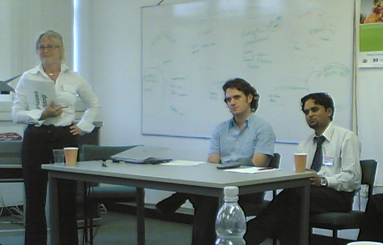This is the Annual ICT4D Postgraduate Symposium third session briefing. It took place in Egham, September 14th, 2006, late afternoon. Here come the notes I took on the fly:
Adesina Iluyemi, Queen Mary’s University of London
Handheld computers as an empowerment tool for a community health worker (CHW) in developing countries
Five strategies of the Ottawa Charter 1986:
- supportive environment
- strengthen community action
- develop personal skills
- healthy public policy
- reorient public policy
CHW work closely with families and are an intereface with population in the community, providing essential health care services. Thus, we should foster CHW as a development figure.
Provided the (proven) features of PDAs, let’s empower CHWs with those devices, in three levels: intrapersonal, interactional and behavioural. Besides, being most CHWs women, empowerment becomes also relevant under the gender (e-)inclusion point of view.
Nikos Nikolidakis, Freie Universität Berlin
Success factors in ICT4D projects: comparative case studies from South Africa
Comparing theory, macro and micro concepts of “success” and factors of success.
Preliminary results:
- Macro level: functioning network between stakeholders
- Macro level: existing national ICT strategy, oriented towards social development (vs. infrastructure development), regulating delivery of ICT infrastructure, concerned with capacity building, being flexible, having an implementation plan.
- Micro level: “it’s not about technology”, commitment of stakeholders, embedded in sufficient infrastructure, participation of potential beneficiaries, embedded in local environment, managed as business model (“it’s not evil to charge the beneficiary… provided he can afford it”), flexible and easy to use and cheap technology.

Hari Krishna Neupane (front), Gudrun Wicander (back left)
Hari Krishna Neupane, London Metropolitan University
Youth & ICT Entrepreneurship: a highly prospective and demanding factor for Socio-economic changes in developing countries – Case Studies from Nepal
Why Business Process Outsourcing (BPO) is gaining quota: the key to success in ramping up talent in a BPO environment is a rapid training module. The training component has to be seen as an important sub-process, requiring constant re-engineering, with remarkable employee benefits. This makes the BPO able to give numerous services (tech, customer, etc.)
ICT Entrepreneurship can have a powerful and direct impact on socio-economic development through employment generation, contribution in national economy, automation of business entreprises and backbone for e-Governance, e-Commerce, Telemedicine, and the Information Society in general.
Urgent necessity: effective implementation of the IT policies and Cyberloaw, development priorities such as attracting foreign investment in IT sector, access to start-up funding and/or business incubators to convert ‘job-seekers’ into ‘job-creators’.

Left to right: Gudrun Wicander, Nikos Nikolidakis, Hari Krishna Neupane
First Annual ICT4D Postgraduate Symposium (2006)
If you need to cite this article in a formal way (i.e. for bibliographical purposes) I dare suggest:
Peña-López, I. (2006) “Annual ICT4D Postgraduate Symposium (session 3)” In ICTlogy,
#36, September 2006. Barcelona: ICTlogy.
Retrieved month dd, yyyy from
https://ictlogy.net/review/?p=434
Previous post: Annual ICT4D Postgraduate Symposium (session 2)
Next post: Annual ICT4D Postgraduate Symposium (session 4)
 RSS feed for comments on this post.
TrackBack URI
RSS feed for comments on this post.
TrackBack URI

